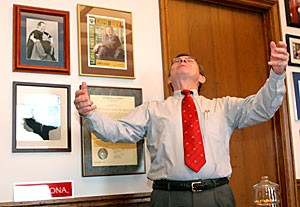After 30 years of leadership in higher education, UA President Peter Likins has learned a few lessons along the way and is excited to be free of responsibility for the first time in his life.
“”One of the things I’ve learned rather late in life, and certainly in my Arizona years, is to trust myself and to trust my judgment, to trust my values and listen carefully to other people’s opinions but not allow my actions to be determined by other people,”” Likins said.
Likins said this lesson has allotted him a staying power that is an atypical characteristic of most university presidents.
“”I’m very proud of the fact that I’ve managed the end game in such a way that I decided when I was going to retire,”” Likins said. “”It was very important to me not to ultimately end up a victim of some kind of a process that I couldn’t control. University presidents, like football coaches, usually leave not through their own discretion.””
University presidents must survive crises, confrontations and complexities of relationships that have the potential to take them out of the job, Likins said.
“”You really want to feel that you’re setting the institution on a better path, and my own belief is that it’s very difficult to do that in five years,”” Likins said.
It is also crucially important that the transition from one president to the next be smooth and minimally disruptive, Likins said.
“”I think that is happening with Robert Shelton,”” Likins said. “”I do believe he and I share values and share a kind of style.””
During both his presidencies at Lehigh University and at the UA, Likins said he was in office long enough to create a culture shift and set each institution’s values and aspirations in a positive direction.
“”I worked very, very hard throughout my life to create a higher level of comfort with diversity,”” Likins said. “”I feel very, very good about the way the Tucson community and the University of Arizona community have embraced those values, perhaps not because of me, but in harmony with me.””
More than any other place he has lived, Tucson has proved to be more accepting of differences, which is a strong reason why he and his wife have decided to spend their retirement here, Likins said.
“”I’ve been able at the University of Arizona not simply to stand up and preach about diversity, but to see other people actively advancing an agenda that I’ve shared in my bones,”” Likins said.
Shelton shares these values and commitment to diversity, Likins said.
“”He has said very clearly to me that he respects what we’ve accomplished here in terms of advancing the diversity agenda and intends to push very hard in the same direction,”” Likins said.
Another measure of the success of a presidency is the way in which it dealt with crises, Likins said.
“”I go back to the day when we had three faculty murdered by a student who then took his own life; that’s a crisis,”” Likins said. “”9/11, that’s a crisis. In a much more modest way I had a student sit-in to deal with early in my presidency was a crisis.””
There is no rulebook or way to prepare for a crisis, such as that October 2002 campus shooting at the UA College of Nursing, Likins said.
“”When I was looking at a television camera with a microphone in front of my face, I had to respond. I had to say something,”” Likins said. “”I said we have to distinguish between grief and fear, and what we feel here is grief, not fear. That was exactly what had to be said and you can’t think in advance about what you’re going to say in a crisis. It just has to come.””
All of this is not learned behavior, it’s just a reflection of who you are, Likins said.
“”I think that if you have come to the decision to rely upon your values to determine your behavior, then what’s really at issue here is your values, and they don’t get altered because you’re 60,”” Likins said.
You learn to rely on yourself to decide what to do, rather then trying to predict what others expect of you, Likins said.
Likins said he will be involved in community service, attend more sporting events and maybe even write a little, but he currently has no real plans on what he’ll do during retirement.
“”I’ll think about that on Monday,”” Likins said. “”Many people have felt somewhat uncomfortable because I don’t have a plan, but my whole life has been so planned that every day of my life was planned and structured.””
Likins said as he crosses his 70th birthday, he wants to be at a stage in life where he is the only one to determine what he does with himself.
“”To determine in advance (the plans for retirement), is a violation of the principle,”” Likins said. “”I need to be free.””
Most importantly, he added, he needs to be free of responsibility and spend time with his wife of 50 years and six kids.
“”This woman has been very patient with me,”” Likins said. “”I work seven days a week, 12, 15 hours a day and all my life and she’s had to put up with that. It’s time that I focus more on her and frankly on myself, too.””









